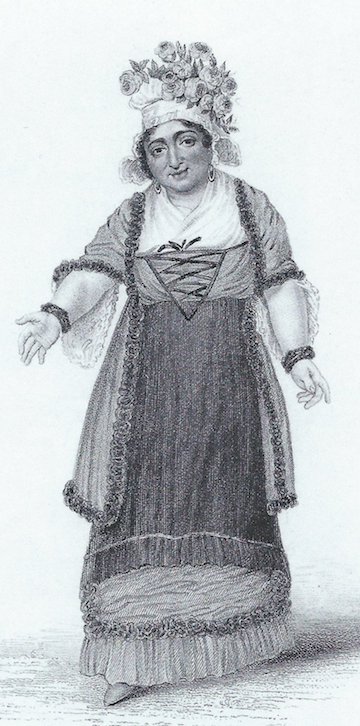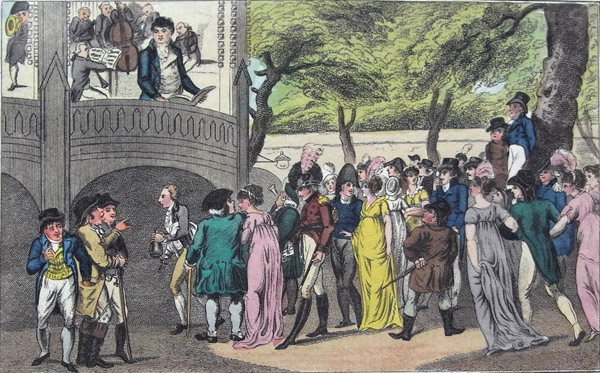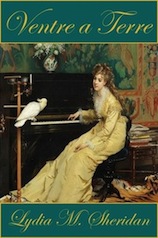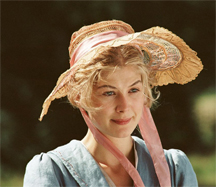Character Interview with Lucien and Horatia
from His Wicked Seduction
Rochester Hall in Kent was full of life for the Christmas holidays. I was fortunate that I could take a chance to interview Lord Rochester and his soon to be bride Horatia Sheridan. Their engagement had caused quite a scandal because Horatia’s brother Cedric was Lucien’s friend, and they had fought a duel on Christmas day over Horatia’s honor, and then all three of them were nearly killed by an assassin from Lucien’s past. It was a story I needed to hear more details about and had reached out to Horatia for an interview.
 Shortly after arriving at the beautiful mansion in the countryside via coach, I was escorted to a drawing room to wait for his lordship and Horatia to arrive. A few moments later, a maid with a tea tray bustled in, followed by a handsome man in his early thirties with dark red hair and a wicked, yet playful smile. He tugged the edges of his silver waistcoat down and walked over to where I sat on the settee and bowed gracefully.
Shortly after arriving at the beautiful mansion in the countryside via coach, I was escorted to a drawing room to wait for his lordship and Horatia to arrive. A few moments later, a maid with a tea tray bustled in, followed by a handsome man in his early thirties with dark red hair and a wicked, yet playful smile. He tugged the edges of his silver waistcoat down and walked over to where I sat on the settee and bowed gracefully.
“Tis a pleasure, Madame.” He captured my hand and feathered a light kiss across my knuckles.
“Thank you, my lord. It’s a pleasure to meet you too.” I knew I was blushing, and by the amused glint in his eyes, he knew I was blushing too. Even betrothed and most decidedly off limits to a woman like me, Lucien, Lord Rochester, was irresistible.
The door opened again, to admit a woman I recognized, my friend Horatia Sheridan. In a rich blue silk gown, a color more suited to a married lady than a unmarried one, she looked stunning. In Rochester Hall, away from society’s judgmental eyes, Horatia was wearing gowns that looked much better with her fair skin.
“Lauren!” She rushed to greet me and we embraced.
“I’m so happy for you, Horatia. When I heard the news, I knew I had to come down and speak to you and meet your future husband.”
“Thank you.” Horatia snuck a little glance at Lucien who was grinning openly. The rogue. I smiled too.
“Why don’t we sit down and you can ask us your questions.” Horatia suggested.
Me: Lucien, it is no secret that you are a member of the League of Rogues. What is it like to be branded a rogue by London’s society?
Lucien: “Good lord, you don’t hold back, do you? Well, yes, I’m a member of the League. There are six of us: Godric, Cedric, Ashton, Charles, Jonathan and myself. I don’t mind the amusing moniker of the name. It suits me quite well. I’m both an acknowledged rake and a rogue, so why deny it?” he leaned back in his chair and crossed one booted knee over his ankles.
Me: So, Lucien – tell us about this Midnight Garden we’ve heard about? Is it the type of place you would think to encounter a young girl?
At this Lucien actually paled. “Right, well. It’s a place of ill repute,” he hesitated. “You know, a place where a man or woman with sensual appetites can be sated. Certainly not a place for a well bred young woman.” He coughed and shot a direct gaze at Horatia. She shrugged at him, then smoothed her skirts, as though unperturbed by his silent chastisement.
Me: Then it must have about given you a heart attack when you noticed Horatia there! Tell us about it?
“I’ll tell you,” Horatia butted in before Lucien could speak. “I think I was more shocked than he, even though it was my plan to find him. You see, I bribed one of his servants to find out where he went in the evenings, and decided that if he wanted a woman to take to bed, it had better be me, since I was so completely in love with him. Then when I came into his room, we each wore masks per the rules of the Garden, but he recognized me, and I knew it was him.” Horatia finally looked over at her lover, a playful little smile on her lips. “He thought he’d teach me a lesson and half-seduce me, but we both lost ourselves to the passion and it was wonderful.”
Me: Horatia – it must have been quite frightening to go to that place – what made you decide to do that?
“Lucien was afraid to fall in love with me because he is my brother’s best friend. Cedric would have killed him if he even looked at me in a desiring way. But I knew I had to be with Lucien, and that meant taking wild risks in order to save him from his attempt to hide from me.”
Me: It seems like you took a round about way to love – did you ever have any doubts that you would be separated?
Lucien answered this time. “Well, when her brother had his pistol pointed at my chest there were definitely doubts that I might shed this mortal coil and never seen my beloved, darling Horatia ever again.”
Horatia’s eyes sparked with tears. “And that wasn’t even the worst of it. When that assassin trapped us in the burning gardener’s cottage, I was convinced we would not make it out. But we did.” She took Lucien’s hand and they shared a secret look of love.
Me: You’ve known each other since you were quite young. Any fun childhood memories?
Lucien laughed. “I was a young man when I met Horatia. She was only fourteen and I was in my twenties. She was also so serious as a child, determined to replace her deceased mother in the family and take care of her older brother Cedric and her younger sister Audrey.”
“And you were all charm and teasing, Lucien. It’s what drew me to you. Like a flower to the sun, I craved your light-hearted spirit to ease my serious one,” Horatia added.
Me: Were any of those memories at Rochester Hall? Had you ever spent the Christmas holidays there before with Lucien’s family?
Horatia shook her head. “I only spent one real holiday at Rochester Hall and it wasn’t during Christmas. I was there during the spring and accidentally ruined Lucien’s attempt to propose another woman. I spilled a bucket of water over her head from the top of a gazebo.”
Lucien chuckled. “I was so furious with you, love, but now I can only thank you from saving me from marrying that awful creature.” He turned to face me. “You see, I was going to marry Melanie Burns. She ended up marrying my dreaded enemy, Hugo Waverly. It was him who sent the assassin after us to kill us, but not because of Melanie. That’s another story, I won’t share here.”
Me: As one of the League of Rogues, we had never thought you’d settle down – not for years! What was it that Horatia did or said to get you to abandon your single life so quickly?
Lucien smirked. “What indeed?” He slid a hand into the pocket of his dark blue trousers and pulled out a piece of fine red silk cut into a strip. “I discovered my little Horatia had a taste for bondage in bed, she like to be tied up, just as much as I loved to tie her up, among other things.” He winked at his future wife. “But the truth is this, she wasn’t afraid to be herself with me, even when I was a fool and tried to push her away. She was brave, bold and beautiful, and I knew a woman like that was a rare find and I couldn’t deny my feelings for her any longer. A woman like that deserves to be loved and cherished, even by a scoundrel like me.”
Me: Are you sad to leave your reputation as a playboy behind – or are you excited for whatever new adventures lie in front of you with your new wife?
He laughed. “Sad to leave behind my lonely bachelor ways? Absolutely not.”
Horatia giggled. “He’s most happily entertained with me. I keep him busy and satisfied.
“No doubt,” Lucien continued. “We’ll have plenty of children to keep us both busy. My mother will get her wish for grandchildren sooner rather than later I expect.”
Me: And now the most important question of the interview – now that Lucien is in wedded bliss, which of her children will Lady Rochester now turn her matchmaking abilities to?
“My mother? Who will her next matchmaking victim be? That’s a frightening guess to make. I feel, if I answer that I’d condemn one of my younger brothers or my sister to a wedding. But, then again, I’d love to torture one of my siblings. Let’s see, next in line by age is Lawrence, he’s like me, too stubborn for even my mother to arrange anything. Then there’s Avery, the family spy, always off on the Continent doing lord knows what to save King and Country. Then there’s Linus, he’s lovestruck with Lucinda Cavendish but far too young to marry, he’s only twenty-one. I would have to my bet on Lysandra, my only sister, just nineteen. However, she’s a real blue stocking, addicting to education and learning, not into husband hunting. I imagine my mother will set her sights on poor Lysa.”
I laughed and thanked Lucien and Horatia for allowing me to ask those rather personal questions. They in turn insisted that I stay with them through the remainder of the holidays. A Russell family Christmas? How could I refuse? Humming merrily, I picked up my belongings and went straight to my rooms, determined to write their story, His Wicked Seduction, one more adventures of the League of Rogues. I can’t wait!
About The League of Rogues, Book 2
Can the League’s most wicked rakehell be tamed? Or has this Rogue fallen too far?
Horatia Sheridan has been hopelessly in love with Lucien, her brother’s best friend, ever since he rescued her from the broken remains of her parents’ wrecked carriage. His reputation as London’s most notorious rakehell doesn’t frighten her, for under his veneer of cool authority she has glimpsed a man whose wicked desires inspire her own.
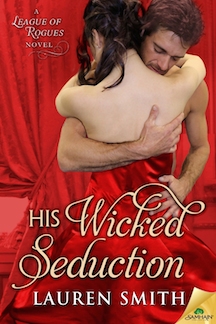 Lucien, Marquess of Rochester, has deliberately nurtured a reputation for debauchery that makes every matchmaking mother of the ton quake with fear. His one secret: he is torn between soul-ripping lust for Horatia, and the loyalty he owes her brother.
Lucien, Marquess of Rochester, has deliberately nurtured a reputation for debauchery that makes every matchmaking mother of the ton quake with fear. His one secret: he is torn between soul-ripping lust for Horatia, and the loyalty he owes her brother.
That loyalty is put to the test when an old enemy of the League threatens Horatia’s life. With Christmas drawing near, he sweeps her away to his country estate, where he can’t resist granting her one wish—to share his bed and his heart.
But sinister forces are lurking, awaiting the perfect moment to exact their revenge by destroying not only whatever happiness Lucien might find in Horatia’s arms, but the lives of those they love.
Warning: This book contains an intelligent lady who is determined to seduce her brother’s friend, a brooding rake whose toy of choice in bed is a little bit of bondage with a piece of red silk, a loyal band of merry rogues and a Christmas love so scorching you’ll need fresh snow to extinguish it.
Amazon • Barnes & Noble • iBooks • Kobo • Samhain • Google
Excerpt
She is going to be the death of me.
“Lucien! You’re not even listening to me, are you? I’m in desperate need of a new valet and you’ve been woolgathering rather than offering suggestions. I daresay you have enough for a decent coat and a pair of mittens by now.”
Lucien Russell, the Marquess of Rochester, looked to his friend Charles. They were walking down Bond Street, Lucien keeping careful watch over one particular lady without her knowledge and Charles simply enjoying the chance for an outing. The street was surprisingly crowded for so early in the day and during such foul wintry weather.
“Admit it,” Charles prodded.
Lucien fought to focus on his friend. “Sorry?”
The Earl of Lonsdale fixed him with a stern glare which, given that his usual manner tended towards jovial, was a little alarming.
“Where is your head? You’ve been out of sorts all morning.”
Lucien grunted. He had no intention of explaining himself. His thoughts were sinful ones, ones that would lead him straight to a fiery spot in Hell, assuming one wasn’t already reserved for him. All because of one woman: Horatia Sheridan.
She was halfway up Bond Street on the opposite side of the road, a beacon of beauty standing out from the women around her. A footman dressed in the Sheridan livery trailed diligently behind her with a large box in his arms. A new dress, if Lucien had to hazard a guess. She should not be out traipsing about on snow-covered walkways, not with these carriages rumbling past, casting muddy slush all over. It frustrated him to think she was risking a chill for the sake of shopping. It frustrated him more that he was so concerned about it.
“I know you think I’m a half-wit on most days, but—”
“Only most?” Lucien couldn’t resist the verbal jab.
Charles grinned. “As I was saying, it’s a bit obvious our leisurely stroll is merely a ruse. I’ve noticed we’ve stopped several times, matching the pattern of a certain lady of our acquaintance across the street.”
So Charles had been watchful after all. Lucien shouldn’t have been surprised. He hadn’t done his best to conceal his interest in Horatia Sheridan. It was too hard to fight the natural pull of his gaze whenever she was near. She was twenty years old, yet she carried herself with the natural grace of a mature and educated queen. Not many women could achieve such a feat. For as long as he’d known her, she’d been that way.
He’d been a young man in his twenties when he met her, and she’d been all of fourteen. She’d been like a little sister to him. Even then, she’d struck him as more mentally and emotionally mature than most women in their later years. There was something about her eyes, the way her doe-brown pools held a man rooted to the spot with intelligence—and in these last few months, attraction…
“You’d best stop staring,” Charles intoned quietly. “People are starting to notice.”
“She shouldn’t be out in this weather. Her brother would have a fit.” Lucien tugged his leather gloves tighter, hoping to erase the lingering effects of the chill wind that slid between his coat sleeves and gloves.
Charles burst out into a laugh, one loud enough to draw the attention of nearby onlookers. “Cedric loves her and little Audrey, but you and I both know that does not stop either of them from doing just as they please.”
There was far too much truth in that. Lucien and Charles had known Cedric, Viscount Sheridan for many years, bonded during one dark night at university. The memory of when he, Charles, Cedric and two others, Godric and Ashton, had first met always unsettled him. Still, what had happened had forged an unbreakable bond between the five of them. Later, London, or at least the society pages, had dubbed them The League of Rogues.
The League. How amusing it all was…except for one thing. The night they’d formed their alliance each of the five men had been marked by the Devil himself. A man by the name of Hugo Waverly, a fellow student at Cambridge, had sworn vengeance on them.
And sometimes Lucien wondered if they didn’t deserve it.
Lucien shook off the heavy thoughts. He was drawn to the vision of Horatia pausing to admire a shop window displaying an array of poke bonnets nestled on stands. Her beleaguered footman stood by her elbow, juggling the box in his arms. He nodded smartly as Horatia pointed out a particular bonnet. Lucien was tempted to venture forth and speak with her, possibly lure her into an alley in order to have just a moment alone with her. Even if he only spoke with her, he feared the intimacy of that conversation would get him a bullet through his heart if her brother ever found out.
Charles had walked a few feet ahead, then stopped and turned to kick a pile of snow into the street. “If this is how you mean to spend the day then consider me gone. I could be at Jackson’s Salon right now, or better yet, savoring the favors of the fine ladies at the Midnight Garden.”
Lucien knew he’d put Charles out of sorts asking him to come today, but he’d had a peculiar feeling since he’d risen this morning, as though someone was walking over his grave. Ever since Hugo Waverly had returned to London, he had been keeping on eye on Cedric’s sisters, particularly Horatia. Waverly had a way of creating collateral damage and Lucien would do anything to keep these innocent ladies safe. But she mustn’t know he was watching over her. He’d spent the last six years being outwardly cold to her, praying she’d stop gazing at him in that sweet, loving way of hers.
It was cruel of him, yes, but if he did not create some distance, he’d have had her on her back beneath him. She was too good a woman for that, and he was far too wicked to be worthy of her. Rather like a demon falling for an angel. He longed for her in ways he’d never craved for other women, and he could never have her.
The reason was simple. His public reputation did not do justice to the true depth of his debauchery. A man like him could and should never be with a woman like Horatia. She was beauty, intelligence and strength, and he would corrupt her with just one night in his arms.
Within the ton, there was scandal and then there was scandal. For a certain class of woman, being seen with the wrong man in the wrong place could be enough to ruin her reputation and damage her prospects. These fair creatures deserved nothing but the utmost in courtesy and propriety.
For others, the widows still longing for love, those who had no interest in husbands but did from time to time seek companionship, and that rare lovely breed of woman who had both the wealth and position to afford to not give a toss about what society thought, there was Lucien. He seduced them all, taught them to open themselves up to their deepest desires and needs, and seek satisfaction. Not once had a woman complained or been dissatisfied after he had departed from her bed. But there was only one bed he sought now, and it was one he should never be invited into.
He glanced about and noticed a familiar coach among the other carriages on the street. Much of the street’s traffic had been moving steadily and quicker than the people on foot, but not that coach. There was nothing unusual about it; the rider was covered with a scarf like all the others, to keep out the chill, yet each time he and Charles had crossed a street, the coach had shadowed them.
“Charles, do think we’re being followed?”
Charles brushed off some snow from his gloved hands when it dropped onto him from a nearby shop’s eave. “What? What on earth for?”
“I don’t know. That carriage. It has been with us for quite a few streets.”
“Lucien, we’re in a popular part of London. No doubt someone is shopping and ordering their carriage to keep close.”
“Hmm,” was all he said before he turned his attention back to Horatia and her footman. One of her spare gloves fell out of her cloak and onto the ground, going unnoticed by both her and her servant. Lucien debated briefly whether or not he should interfere and alert her to the fact that he and Charles had been following her. When she continued to walk ahead, leaving her glove behind, he made his decision.
Lucien caught up with his friend still ahead of him on the street. “I’ll not keep you. Horatia’s dropped a glove and I wish to return it to her.”
“Plagued by a bit of chivalry, eh? Go on then, I want to stop here a moment.” He pointed to a bookshop.
“Very good. Catch me up when you’re ready.”
Lucien dodged through the traffic on the road and was halfway across the street when pandemonium struck.
Bond Street was turned on its head as screams tore through the air. The coach that had been shadowing him raced down the road in Lucien’s direction. Yet, rather than trying to halt the team, the driver whipped the horses, urging them directly at Lucien.
He was too far across the street to turn back; he had to get to safety and get others out of the way. Horatia! She could be trampled when it passed her. Lucien’s heart shot into his throat as he ran. The driver whipped the horses again, as if sensing Lucien’s determination to escape.
“Horatia!” Lucien bellowed at the top of his lungs. “Out of the way!”
About the Author
Amazon Best Selling author, Lauren Smith is an attorney by day, author by night, who pens adventurous and edgy romance stories by the light of her smart phone flashlight app. She’s a native Oklahoman who lives with her three pets: a feisty chinchilla, sophisticated cat and dapper little schnauzer. She’s won multiple awards in several romance subgenres including being an Amazon.com Breakthrough Novel Award Quarter-Finalist and a Semi-Finalist for the Mary Wollstonecraft Shelley Award.
Website • Facebook • Twitter •Goodreads
“Smith’s fast-paced historical keeps readers on their toes as they’re taken hostage by a whirlwind of characters and an unforgettable romance. Readers will get their fair share of emotional outbursts, which includes laughter, lust, anger and sadness…it’s action-packed, sizzling hot and readers of all genres will enjoy the scramble to the finish.”—RT Book Reviews Magazine
“Lauren Smith’s debut League of Rogues novel is a fun, clever and wonderfully sympathetic read that will no doubt earn her a number of fans. Her insight into her characters and willingness to take risks with them is impressive…and brought a fresh voice and a heap of compassion, transforming it into something highly readable and quite enjoyable.”—The Romance Reviews
“The best thing for me was the quality of Lauren Smith’s writing. I will read her again. She is a fresh voice to watch out for.”—Romantic Historical Reviews
“I really enjoyed Wicked Designs, Lauren Smith’s debut Regency historical novel. This witty and entertaining romance features an emotionally scarred hero, a smart heroine and a loveable group of rogues… Emily is a delightful heroine. She is smart, courageous and spirited enough to stand up for herself. I love her determination to outwit her captors and escape. She certainly keeps those five rogues on their toes!”—Rakes and Rascals.com






















